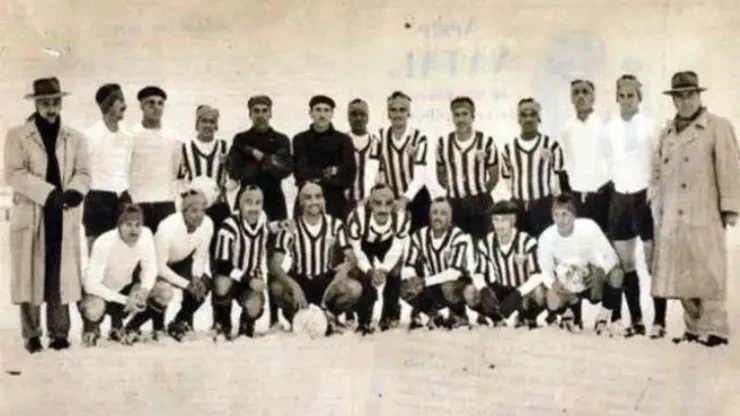In 1950, after Brazil lost to Uruguay in the World Cup final, no national or continental matches took place in South America for the remainder of the year.
Following the World Cup, a commission was formed by the German FA to explore the possibility of a Brazilian club team playing a series of friendlies against some of the Germany’s club teams. Because of the Maracanazo (Brazil’s loss to Uruguay in the 1950 World Cup) and Germany’s fallout from World War II, clubs from Rio de Janeiro and Sao Paulo — the hub of soccer in the country — all passed on the chance. That ushered in Atletico Mineiro from Minas Gerais to take the important leadership role for Brazil.
To help with the healing process, in a time when North and South American club teams rarely traveled to Europe to play friendlies, Brazilian club Atletico Mineiro embarked to Europe to play matches in Germany, Austria, Belgium, Luxembourg and France. The tour spanned from November to December of that year. In total, the club won six matches, lost two, and tied two. They scored 24 goals, and conceded only 18 during a rather successful tour.
The squad list for the tour was: Kafuga, Mao de Onca, Moreno, Marcio, Juca, Oswaldo, Afonso, Ze do Monte, Haroldo, Lucas, Laura, Zezinho, alvinho, Vava, Nivio, Vicente Perez, Barbatana, Vaguinho, Murilinho. Managing the side during the tour was Ricardo Diez, who was in his first of four spells in charge at Mineiro. On this tour, they were deemed the “Ice Champions.”
The delegation arrived in Frankfurt on October 27, and were welcomed by the German media since this was the first time a Brazilian club had played in the country. They would travel on to Munich where they played 1860 Munich (a very successful club at the time). On November 11, they defeated 1860 Munich 4-3 in front of 35,000 spectators.
The next stop in the “Winter Tournament” as it was called was against Hamburg SV in Hamburg, where Atletico again won, this time by a score of 4-0 in front of 20,000 people.
Less than 24 hours later, they were on the road to Bremen where they lost 3-1.
During the tour they did get a rest, albeit a week, during which they traveled to Gelsenkirchen, where they beat Schalke 3-1 in front of 30,000 people. Overall, they attracted large crowds, and got to show Germany that soccer in Brazil was worth watching.
The next stop was in Austria in the city of Vienna where Rapid Wien smashed Atletico 3-0 in front of 60,000 spectators. The scoreline was so lopsided because the Rapid Wien side formed the backbone of the Austrian 1954 World Cup side. The press in Vienna had very poor reports of the match. They said the Mineiro players complained about refereeing and the behavior of the crowd. The crowd, on the other hand, was celebrating the visiting team and cheering them on, thus the confusion among Atletico Mineiro probably came from not being able to understand the local language.
On November 20, the team played FC Saarbrucken, a German club that was playing in the French leagues because of being a French protectorate, which Atletico won 2-0.
They moved onto Belgium, where they met Anderlecht, the Belgian first division champions, beating them in front of 40,000 people 2-1 on November 22.
Then they went back to Germany for a match on November 26 against Eintracht Braunschweig, which they tied 3-3 in front of 30,000 people. Another 3-3 followed in Luxembourg against Union.
The tour finished in Paris against Stade Francais on December 7, which Atletico won 2-1 in front of 4,000 spectators. The match was played under such extreme low temperatures that goalkeeper Kafunga had to play with hot water bottles on his hands, and Barbatana, a midfielder, got hypothermia.
The tour ended because the money ran out, and a match against French champions Lille was abandoned because of frigid temperatures.
Atletico Mineiro returned to the Maracana where they got a standing ovation at a local match. Some 50,000 spectators welcomed them home at Belo Horizonte. For the tour, the leading scorer was Vaguinho and Luis Miranda with six goals each, followed by Nivio with five.
200+ Channels With Sports & News
- Starting price: $33/mo. for fubo Latino Package
- Watch Premier League, Women’s World Cup, Euro 2024 & Gold Cup
The New Home of MLS
- Price: $14.99/mo. for MLS Season Pass
- Watch every MLS game including playoffs & Leagues Cup
Many Sports & ESPN Originals
- Price: $10.99/mo. (or get ESPN+, Hulu & Disney+ for $14.99/mo.)
- Features Bundesliga, LaLiga, Championship, & FA Cup
2,000+ soccer games per year
- Price: $5.99/mo
- Features Champions League, Serie A, Europa League & Brasileirāo
175 Premier League Games & PL TV
- Starting price: $5.99/mo. for Peacock Premium
- Watch 175 exclusive EPL games per season






